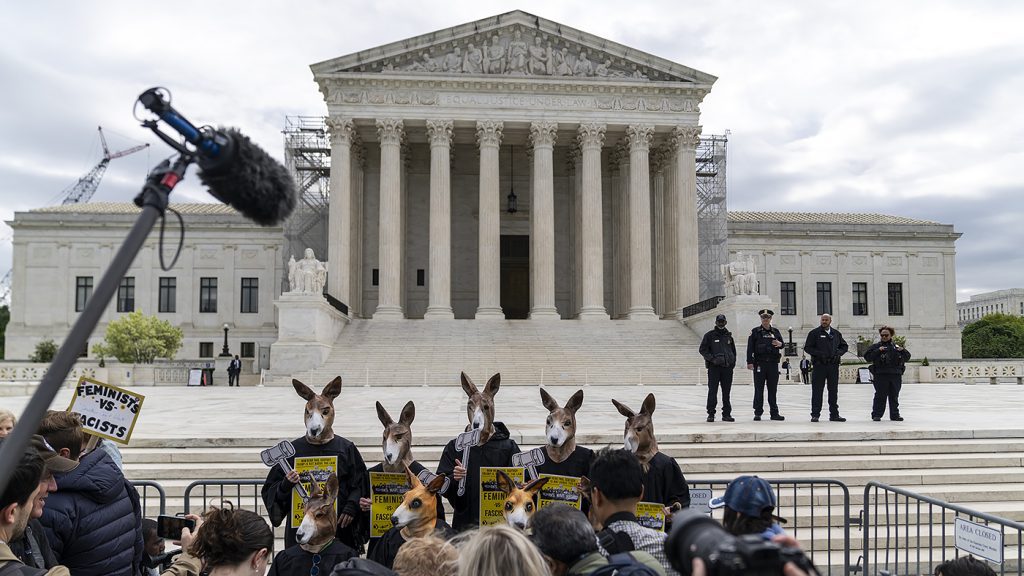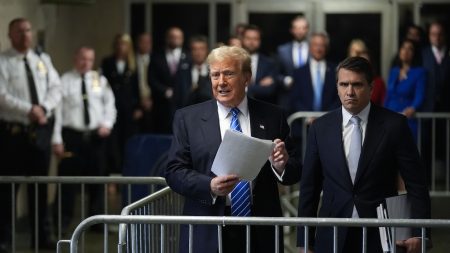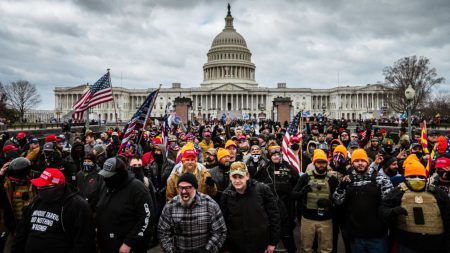The Supreme Court appeared ready Thursday to provide former President Trump with some protection from criminal prosecution after listening to two hours of arguments from his lawyers and prosecutors.
Here are six things to know about a significant day at the court.
Justices were cautious of broad immunity claims
Justices from both sides expressed doubt about Trump’s argument that former presidents should have complete immunity for all official acts while in the White House.
Trump attorney D. John Sauer argued, “If former presidents lack immunity from criminal prosecution, the presidency as we know it cannot exist,” asserting that such a principle is needed to avoid hindering presidential decision-making.
Liberal justices at the court pressed Sauer, questioning whether his arguments for broad immunity would encourage a future president to commit crimes.
Justice Ketanji Brown Jackson asked Sauer, “I’m trying to understand what would discourage turning the Oval Office into the center of criminal activity in this country.”
Justice Sonia Sotomayor said Trump’s arguments allowed for much more than making “a mistake” while in office.
“A president is entitled to use the resources of his office for personal gain without facing criminal responsibility — that’s what you’re attempting to persuade us to accept,” she said.
The conservative justices also expressed some doubt at times. Even Justice Samuel Alito, one of the court’s prominent conservatives, called Trump’s request “very robust.”
Hypothetical scenarios guided the argument
The justices presented Sauer with hypothetical situations, questioning whether everything from selling nuclear codes to directing the military to assassinate a rival would be covered by presidential immunity.
“Well, what if you have — let’s say the official act is appointing ambassadors, and the president appoints a particular individual to a country, but it’s in exchange for a bribe. Somebody says, ‘I’ll give you a million dollars if I’m made the ambassador to whatever.’ How do you analyze that?” Chief Justice John Roberts said.
“If the president decides that his rival is a corrupt person and he orders the military or orders someone to assassinate him, is that within his official acts for which he can get immunity?” Sotomayor asked.
“That well could be an official act,” Sauer responded to Sotomayor’s scenario.
Justice Elena Kagan sounded alarmed by the image of such a response.
“That answer sounds to me as though it’s like, ‘Yeah, according to my test, it’s an official act,’ but that sure sounds bad, doesn’t it?” Kagan said, causing Sauer to agree.
Indications suggest that the trial will be postponed
The extensive discussion by the justices on how to set boundaries around what might be official versus personal conduct implies that they might establish some type of immunity that extends beyond a president’s term in office.
Doing so would almost certainly postpone Trump’s numerous legal proceedings.
The court already delayed Trump’s case involving election interference simply by considering the immunity claims. If the case is sent back to the district court for further assessment, it will only consume more time.
Any additional decision could be challenged, a process that might result in another appeal to the high court.
Two of Trump’s other legal cases could also be affected.
Trump has made similar arguments in his Georgia election interference case and his Florida documents case.
Justices examine the idea of politicized prosecutors
At various points, the justices avoided addressing another concern raised by Trump multiple times – that he is the target of a politically motivated prosecution.
“Relying on the faith — good faith of the prosecutor may not be adequate in some instances. I’m not suggesting here,” said Roberts.
Like Roberts, the other justices seemed hesitant to dive into Trump’s claims that his indictments are politically motivated.
When Alito expressed concerns about politicized prosecutors, Michael Dreeben, a lawyer on Smith’s team, began to bring up the specifics of Trump’s case. Alito stopped him, insisting they keep their discussion in the “abstract.”
“The vast majority of attorneys general and Justice Department attorneys, and we both served in the Justice Department for a long time, are honorable people and they take their professional ethical responsibilities seriously,” said Alito.
“But there have been exceptions, correct?”
Dreeben emphasized there are “layered safeguards” that protect against flawed prosecutions.
“We are not endorsing a regime that we think would expose former presidents to criminal prosecution in bad faith, for political animus, without adequate evidence. A politically driven prosecution would violate the Constitution,” he said.
Smith’s status as special counsel emerged at times during the argument, including when Justice Clarence Thomas noted a position put forward by two conservative law professors that Smith’s appointment was unlawful.
“Did you, in this litigation, challenge the appointment of special counsel?” Thomas asked Sauer, Trump’s lawyer.
Smith, sitting at the counsel table, leaned forward in his chair and turned inward to face Sauer.
Trump agreed with the law professors but had “not yet” raised such a challenge in the case, the lawyer explained.
Conservative justices expressed irritation with Smith’s accusations.
Several conservative justices expressed annoyance at the charges in Trump’s federal election subversion indictment.
The Supreme Court is actively considering a Jan. 6 defendant’s challenge that could narrow the scope of a statute prosecutors have used to indict hundreds of rioters and Trump with obstruction charges.
“Nobody knows what corrupt intent means, we’ve been around that tree,” Justice Neil Gorsuch said, referencing the key legal question in the case.
He later added, “Maybe we’ll find out sometime soon.”
Two conservatives, Alito and Justice Brett Kavanaugh, complained about the broadness of the federal crime of conspiring to defraud the federal government, which is one of Trump’s four charges in the case.
“The issue is the vague statute, you know, obstruction and [Section] 371, conspiracy to defraud the United States, can be used against a lot of presidential activities historically with a — a creative prosecutor who wants to go after a president,” Kavanaugh said.
Alito described it as different from most other fraud provisions.
“I don’t want to argue about the specific use of that, of [Section] 371, conspiracy to defraud the United States, in this case, but do you not agree that it is an especially broad statutory prohibition?” he asked.
Justices agreed on significant consequences
The justices repeatedly encouraged the attorneys to look beyond the details of Trump’s case and instead think about how the Supreme Court’s rulings will affect future administrations.
As Gorusch stated, “We’re establishing a rule for the long term.”
Kavanaugh indicated their decision will “come back and be used against the current president or the next president.”
“This case has enormous implications for the presidency, for the future of the presidency, for the future of the country, in my opinion,” said Kavanaugh.
Alito suggested that determining that former presidents have no immunity would lead them to try to self-pardon themselves during their last few days in office.
“If an incumbent who loses a very close, hotly contested election knows that a real possibility after leaving office is not that the president is going to be able to go off into a peaceful retirement but that the president may be criminally prosecuted by a bitter political opponent, will that not lead us into a cycle that destabilizes the functioning of our country as a democracy?” asked Alito.









